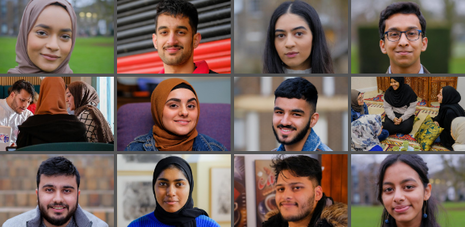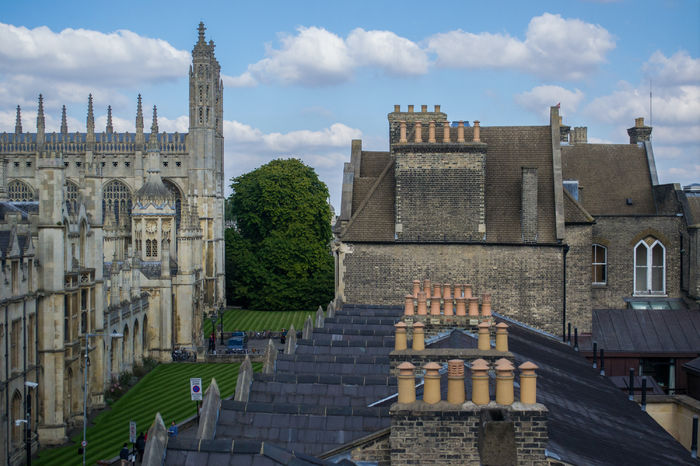‘Get in Cambridge’ media campaign seeks to attract Pakistani and Bangladeshi applicants
The new social media films document the experiences of ten UK Pakistani and Bangladeshi students in an effort to improve the University’s diversity

The University has commissioned a new series of ‘targeted social media videos’ featuring ten UK Pakistani and Bangladeshi students in an attempt to “break down cultural barriers and promote tolerance” as well as encourage ethnic minorities to apply to Cambridge.
The series, which features students from six different colleges studying nine different courses, follows students through “lectures, prayers [and] University cultural and religious society events”.
The new film series builds on the ‘Get in Cambridge’ social media campaign spearheaded last year by YouTube vlogger and Cambridge graduate, Courtney Daniella, which sought to improve diversity among the University’s undergraduates and to encourage more applications from black students.
While the number of British Black and Ethnic Minority (BAME) undergraduate students was at a record high of 26.8% in 2019-20, UK Pakistani students represented only 1.3% of new undergraduates in 2019, while UK Bangladeshi students represented only 1.1% of incoming students.
A University website promoting the new films includes quotations from one of the series’ participants, Zainab Haider - a student in Psychological and Behavioural Sciences at Newnham College.
Haider admits that originally “[her] perception of Cambridge was that it was all middle-class and white, that it wasn’t somewhere for a little brown girl from Bradford”, but now feels that “[her] faith [and] cultural identity has actually been strengthened because of the spaces at Cambridge - the Cambridge Islamic Society and the cultural societies like the Pakistan Society and the Bangla Society.”
She also expressed gratitude for the opportunity “to meet so many people”, reminding viewers that “you’re not on your own; there are people who look like you, who talk like you, and you do find them.”
Jon Beard - Director of the Cambridge Admissions Office - detailed in a separate statement on the website that “[The University] is taking a new approach with the second phase of the Get in Cambridge films, using different social media channels to reach prospective students in a more targeted way.”
Beard recounted a conversation in which, during an Open Day event, a Muslim sixth former asked whether Cambridge students were allowed to wear headscarfs, which led the Admissions Office to “realise there are a lot of myths that persist about studying at Cambridge and [the University] need to continue to work hard to dispel them.”
In the second stage of ‘Get in Cambridge’, the University has included an additional six ‘Myth vs. Reality’ videos aimed at dispelling misconceptions such as Cambridge being more expensive to study at than other universities - with a 2019 interactive map from Market-Inspector ranking Cambridge as the 38th most expensive in the UK.
The SU's BME Campaign told Varsity that they have welcomed “the launch of the Get in Cambridge campaign, which recognises the need for outreach that specifically targets British Bangladeshi and Pakistani students [and] platforms [their] lived experiences at Cambridge and the work they have been doing to encourage others from similar backgrounds to apply.”
The statement also expressed a hope that “the University will build on the campaign with concrete measures to support widening participation [...] for example, by dedicating resources to the development of the student-led CamSpire scheme [...] launched in 2019 by the then-CUSU Access & Funding Officer, Shadab Ahmed.”
Varsity also spoke to Ibz Mo, the YouTube vlogger graduate and self-described ‘Hackney raised boy turned Cambridge University Student’ who rose to prominence through documenting his everyday experiences as an ethnic minority student at Oxbridge.
In his statement to Varsity, he praised the series as an “authentic and student led [...] starting point [...] for [...] tackling the lack of representation”, but warns that “this campaign [...] so far is just raising the visibility of Pakistani/Bangladeshi students currently at Cambridge in an attempt to bring this issue [of underrepresentation] to the forefront of discussions within the University and the public.”.
Mo, while commending the “amazing and emotive video”, feels “there is still so much data that needs to be gathered if this campaign is going to succeed.”
“Unless all bodies start to ‘walk the talk’”, he declares, “this campaign is not going to be enough.”
Drawing upon the example of the former CUSU Access Officer Shadab Ahmed, and his “successful pilot of the Arab, Pakistani and Bangladeshi residential school [the CamSpire scheme]”, the youtuber suggested that more concrete funding from the University in programmes such as this could bolster Pakistani/Bangladeshi attainment, so that such students’ grades could be more likely to be closer aligned with the “GCSEs [and] A-Levels that Cambridge typically ask for.”
The drive to encourage improved ethnic minority admissions comes as the University has recently acknowledged its “need to do more to support the promotion of BAME staff” through its Race Equality Action Plan - with only 13% of the 87.1% of staff who disclosed their ethnicity in the University’s 2018-19 Equality and Diversity Information Report identifying as BAME.
The film series also comes as a spotlight has focused on Cambridge to tackle structural racism issues in the University amid a wave of Black Lives Matter protests; Dr Priyamvada Gopal, who was abused online for her post on Twitter attacking White Supremacy, called on the University to “take the lead in getting the public discussion on race [...] to be more complex and rich”. While Dr David Starkey resigned from his fellowship at Fitzwilliam College after positing that “slavery was not genocide”.
The University meanwhile “remains committed to continuing its work to widen access” as Covid-19 persists, moving activities with organisations such as the Sutton Trust and Target Oxbridge online, and holding its next set of virtual open days on the 17th and 18th September.
 News / Colleges charge different rents for the same Castle Street accommodation2 March 2026
News / Colleges charge different rents for the same Castle Street accommodation2 March 2026 News / King’s hosts open iftar for Ramadan3 March 2026
News / King’s hosts open iftar for Ramadan3 March 2026 Theatre / Lunatics and leisure centres 4 March 2026
Theatre / Lunatics and leisure centres 4 March 2026 News / Angela Merkel among Cambridge honorary degree nominees27 February 2026
News / Angela Merkel among Cambridge honorary degree nominees27 February 2026 News / News in Brief: waterworks, wine woes, and workplace wins 1 March 2026
News / News in Brief: waterworks, wine woes, and workplace wins 1 March 2026








